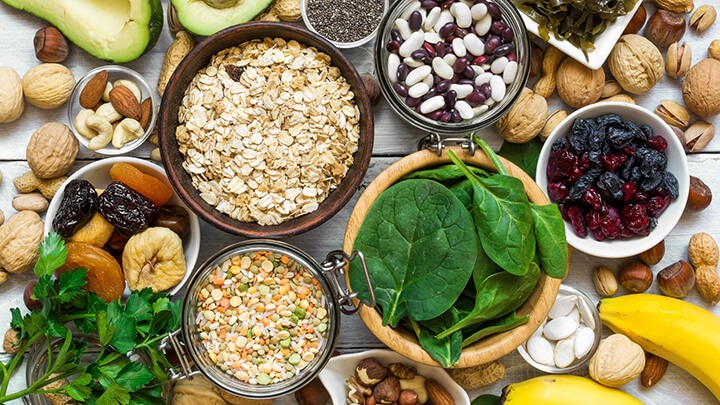If you’re like most people, boosting your immunity has been on your mind these days. If it isn’t, then you seriously need to consider how a healthy immune system affects mood, mental health, endocrine disorders, skin conditions, cancer, and yes, fighting viruses like COVID-19. However, if your gut health is poor, your immunity is as well. But there are ways you can improve your gut health and, in turn, boost your immunity — here’s how.
How do you know if your gut health is poor?
If you have gas, feel bloated, have heartburn, experience constipation or have diarrhea, then these are all signs that you might be sporting an unhealthy gut. That’s because an unhealthy gut has a harder time processing food and eliminating waste.
Inside the gut are trillions of live microorganisms that promote normal gastrointestinal or (GI) function. These organisms protect the body from infection. Until recently, most believed that gut flora simply helped aid digestion. Now science tells us that there is a huge link between healthy gut flora and the body’s immune system. Dan Peterson, assistant professor of pathology at the Johns Hopkins University School of Medicine, notes that “a huge proportion of your immune system is actually in your GI tract.” A healthy gut, therefore, plays a huge role in boosting your immunity.
The role your immune system plays on infection
Did you know your immune system has quite the memory? It records every microbe it has ever defeated. White blood cells (B- and T-lymphocytes), known as memory cells, not only recognize but also destroy, fast, the microbe that once made you sick.
It’s important to note, however, that some infections (like the flu and common cold) have to be fought over and over again since so many strains of the same type of virus can resurface. Therefore, catching a cold or flu from one virus does not mean you are immune to others.
So, with new strains of viruses like COVID-19 showing up on your doorstep, you can see why it’s so important to keep your immune system healthy and strong. And one of the best ways to do this is by improving your gut health.
Discover any food allergies and intolerances
Allergies and intolerances to foods such as eggs, dairy, and gluten are on the rise. Research suggests that changes in the intestinal flora may be the reason why. Let’s talk about gas and bloating. If you experience gas, bloating, abdominal cramping and pain, diarrhea, skin rashes, nausea, fatigue, and acid reflux, then you may be suffering from certain food intolerances. No one knows better than you what foods trigger gas and bloating. Try eliminating these foods and note if symptoms improve.
Keep sugar at bay
Seventy percent of the immune system is located in the gut and supported by healthy gut bacteria. So, it’s essential to maintain a balance of healthy bacteria. A diet high in sugar only serves to feed bad bacteria and yeast. This not only keeps you fatigued and sluggish but also affects how well the immune system functions.
Stock up on fermented foods
Fermented foods such as kimchi, sauerkraut, and pickles contain vitamins, minerals, antioxidants, and gut-friendly probiotic bacteria. But not all fermented foods are created equal. Jarred pickles found on grocery store shelves may be yummy, but those are usually pickled without live organisms. Make sure the fermented foods you choose contain live organisms. These products usually have the words “naturally fermented” or “lactic acid fermented pickles” printed on the label. They’re usually made with organic products and brine and should be refrigerated. Additionally, when you open the jar, look for bubbles in the liquid, which suggest that live organisms are inside the jar.
Add kefir to your diet
If you like yogurt but have never tried kefir, you may be surprised to discover that kefir, a fermented milk product, tastes just like liquid yogurt. Beyond supplying vital nutrients, it also contains probiotics. In fact, research from Frontiers in Microbiology suggests kefir has been associated with a range of health benefits, including antimicrobial activity, tumor suppression, increased speed of wound healing, and a boosted immune system.
Add a high-quality probiotic to your diet
A good diet is paramount for improving gut health. Supplements containing probiotics can also be helpful in maintaining good gut health. Probiotics are microorganisms that can improve and maintain gut health. They increase the number of beneficial bacteria in your gut — when taken in the right amounts.
Self-dosing with bacteria can be very beneficial for gut health and boosting immunity. An estimated 100 trillion microorganisms inhabit healthy bowels. These microorganisms, according to Harvard Health, are helpful, gut-dwelling bacteria that keep harmful microorganisms in check. Additionally, they aid digestion, nutrient absorption, and contribute to immune function.
However, not all probiotic supplements are of equal quality or will actually provide benefits. Choose a high-quality probiotic that contains a premium blend of beneficial microorganisms.
Add prebiotic foods to your diet
Probiotics come in supplement form and are in foods such as yogurt, kefir, sauerkraut, and kombucha. Prebiotics, on the other hand, are plant fibers found in foods such as whole grains. Research from the University of Calgary suggests that these prebiotic fibers may improve obesity and improve or normalize the imbalance of gut microbiota. Other prebiotic foods you may want to consume to support a healthy gut and immune system include bananas, onions, garlic, greens, soybean, and artichokes.
Now more than ever it’s important to consider your gut health and the role it plays on your immune system. A strong immune system helps your body fend off infection, bacteria, and viruses that enter your body, especially during cold and flu season.
Disclaimer: “None of this has been proven to prevent, treat or remedy COVID-19, these are just things to consider”
-The UpWellness Team







